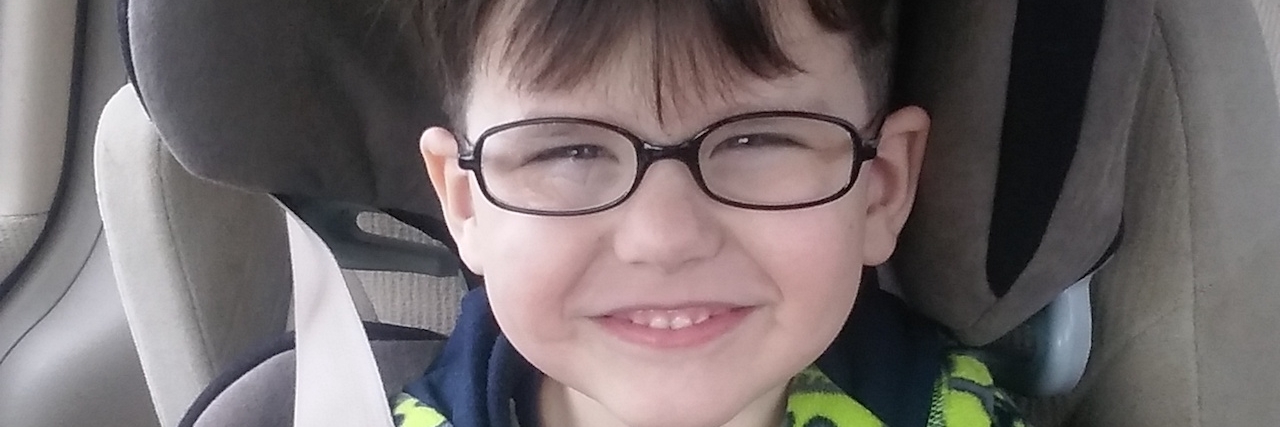When a Woman Whispered How She 'Can't Stand Parents Who Can't Control Their Kids'
I remember the day I finally got the answers I needed about my 4-year-old son’s behavior. April 1, 2016. That day I took him to have his evaluation done, thinking he would be diagnosed with attention-deficit/hyperactivity disorder (ADHD), like his 9-year-old sister. As I gave his therapist all the information she needed, I saw a light turn on in her head. After doing a few tests of his response to touch, she turned to me and said, “He does not have ADHD. He has sensory processing disorder (SPD), and it looks like he might be on the autism spectrum.”
My head was spinning. Surely I would have noticed if my son had these diagnoses, right? She explained to me how sensory disorders often look like symptoms of ADHD. My mind jumped back to the day I made the appointment. I was checking my 9-year-old out of school, my son and my 2-year-old in tow. My son started to cry and throw a fit while we stood in the bricked hallway of the school. The secretary came out of the office and instructed me to wait outside, since my child was being a disruption. I walked outside with my head down to wait.
After this three-hour evaluation and the diagnoses, I went home and straight to Google to research what sensory disorders are all about. Within 30 minutes, my son’s entire life made sense to me. All four years of it — the reason why he rarely slept, or why he likes to wears his Halloween spandex costume or long sleeve shirts. That day at the school made sense. The noises in the hallway bouncing off the bricks and making it sound distorted had hurt my son and caused him to have a meltdown. He changes his clothes a thousand times a day. It made sense! Finally, I knew how to help my child. I knew exactly what to watch for and what to expect.
I was relieved to have answers. I was also upset and confused because all this time I thought I was parenting “wrong.” “Maybe these people whispering about my parenting skills in public places were right,” I often thought. No, it had nothing to do with bad parenting — but everything to do with being unaware of something I couldn’t see.
On the Monday following that appointment, I had my own appointment for the OB/GYN. My husband couldn’t take off work, so I took my son and 2-year-old with me. I was confident in my newfound knowledge and had sensory items packed to try and make it easier. I sat down in a seat with another row of seats behind it connected at the back. My son had my phone watching YouTube with headphones in his ears to block out background noise. Then the phone froze. He could hear everyone around him and began to have a meltdown. I frantically rushed to get YouTube playing. When it did, his muscles relaxed. No major meltdown!
However, an older lady sitting behind me decided to “whisper” to her daughter, “Would you like to move? I can’t stand parents who can’t control their kids.”
It was loud enough for me to hear. I politely turn around and responded: ” Actually, I do have control of my kid. He has a sensory disorder and is autistic. Since the month of April is Autism awareness month, you might want to look into the statistics for both. Possibly educate yourself on what they consist of. One day you might be the person having to defend your grandchild against people’s hurtful words.”
The lady got quiet and moved with a look of embarrassment on her face. For the first time, I felt proud of myself and confident with the answers I needed for so long.
I can hold my head high and free my mind of any worry I once had that I was a “bad” parent. I explain to people who make rude comments towards me or my child exactly the reason why my child is having a meltdown. I no longer feel embarrassed when I have to sit in the entrance of a store, swaddling my son, calming him from a meltdown because all the race car carts are gone and he doesn’t like the texture of the regular cart. As people walk in the store staring, I just let them stare. It makes no difference to me. I am parenting, and every child requires different parenting. Knowing is the most empowering tool a parent of a child with disabilities can have. When all the pieces fit, life is easier.
The Mighty is asking the following: Describe a moment you were met with extreme negativity or adversity related to your disability and/or disease (or a loved one’s) and why you were proud of your response — or how you wish you could’ve responded. Check out our Submit a Story page for more about our submission guidelines.

